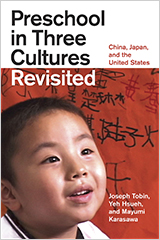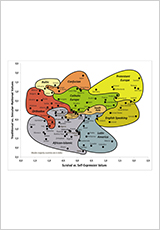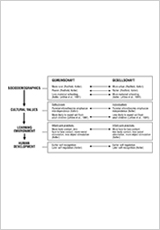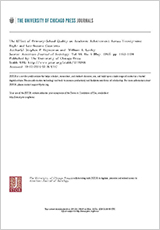교육환경의 문화 비교연구
교육환경의 문화 비교연구 (Comparative Studies in Culture and Education) focuses on explicit and implicit comparisons of education systems and educational contexts across countries with a cultural focus. What happens inside schools are heavily influenced by cultural factors such as educational beliefs and attitudes shaped outside of the school setting. Furthermore, these are not static. They are embedded within a broader changing historic, cultural, socioeconomic, demographic, and political context. The role of parents (and private education in the case of Korea) is particularly important, and intersects with capitalist and neoliberalist discourses in today’s economy. For instance, parents who believe that education is the route to upward mobility are likely to invest heavily in their children’s education and most importantly transmit such values to their children. 교육환경의 문화 비교연구 aims to understand how such educational contexts vary cross-nationally. Studies focused on specific academic outcomes tend to be quantitative while studies focused on the cultural aspects of learning tend to be qualitative.
Here are some examples of questions we ask:
- Do children and parents hold different beliefs about learning and education across countries and cultures, and why so? How does this intersect with gender and class?
- What are the strongest predictors of educational achievement, and are they universal?
- Why are some ethnic minority groups more academically successful than others?
- How does urbanization, marketization, modernization, and globalization, influence educational beliefs and practices?
- Is education fever and credentialism (emphasizing credentials) an East Asian phenomenon or is it a global phenomenon? How so?
교육환경 연구는 학교나 교실 내에서 일어나는 교육 현상뿐만 아니라, 학교교육에 지대한 영향을 미치는 사회에 대한 연구를 포괄한다. 교육환경과 문화 비교연구는 특히 교육과 사회의 관계를 규명하고 국가 간 교육환경과 문화를 비교하는데 의미를 둔다. 학교 내에서 일어나는 교육현상들은 교육적 신념이나 학교 밖에서 형성된 태도와 같은 문화적인 요인의 영향을 크게 받는다. 이는 역사, 문화, 사회 경제적, 인구 통계학적, 그리고 정치적 맥락 안에 자리잡고 있기 때문에 유동적이다. 부모의 역할(그리고 한국의 경우에는 사교육)은 특히 중요하며, 오늘날 경제 자본주의와 신자유주의 담론과 밀접한 관계가 있다. 예를 들어, 교육을 경제적 또는 사회적 신분상승의 수단이라고 믿는 부모들은 자녀의 교육에 크게 투자하고, 자녀들에게도 자신들의 가치관을 그대로 전달한다. 교육환경 문화 비교 연구의 목표는 그러한 교육적 맥락이 어떻게 범국가적으로 수렴하는지 아니면 분산되는 양상을 보여주는지 이해하는 것이다. 특정한 교육성과(예: 학업성취 혹은 학업동기)에 초점을 맞춘 연구는 양적인 성향이 강하며, 학문의 문화적 측면에 초점을 맞춘 연구는 질적인 경향이 있다.
- 아이들과 부모들의 교육신념(educational beliefs)은 범국가적으로 또는 문화적으로 어떻게 차이가 나는가? 젠더와 계층에 따른 교육신념 차이는 어떠한가?
- 학업성취에 가장 큰 영향을 미치는 요인은 무엇이며, 이는 보편적인가?
- 소수 민족 중 교육적 성취가 높은 민족들의 특성은 무엇이며, 이에 대한 메카니즘을 어떻게 정의해왔는가?
- 도시화, 시장화, 현대화, 그리고 세계화는 교육신념과 교육실제(educational beliefs and practices)에 어떠한 영향을 미치는가?
- 교육열과 학벌주의는 동아시아만의 현상인가, 아니면 세계적인 현상인가?
Readings & Resources
Preschool in Three Cultures Revisited: China, Japan, and the United States
Joseph Tobin, Yeh Hsueh, and Mayumi Karasawa | 2009
Linking social change and developmental change: shifting pathways of human development
Patricia M. Greenfield | 2009
The Effect of Primary-School Quality on Academic Achievement Across Twenty-nine High- and Low-Income Countries
Stephen P. Heyneman and William A. Loxley | 1983
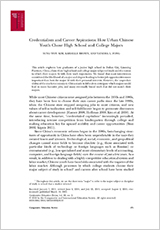
Credentialism and Career Aspirations: How Urban Chinese Youth Chose High School and College Majors
Sung won Kim, Kari-Elle Brown, and Vanessa L. Fong
Preschool in Three Cultures Revisited: China, Japan, and the United States
Joseph Tobin, Yeh Hsueh, and Mayumi Karasawa | 2009
Linking social change and developmental change: shifting pathways of human development
Patricia M. Greenfield | 2009
The Effect of Primary-School Quality on Academic Achievement Across Twenty-nine High- and Low-Income Countries
Stephen P. Heyneman and William A. Loxley | 1983

Credentialism and Career Aspirations: How Urban Chinese Youth Chose High School and College Majors
Sung won Kim, Kari-Elle Brown, and Vanessa L. Fong
